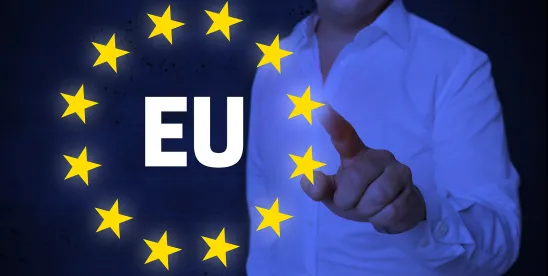Introduction
This document sets out the actions to be taken by businesses to ensure compliance with and/or take advantage of the new EU Foreign Subsidy Regulation (FSR) that will enter into force in July 2023.
The aim of the FSR is to ensure that competition is not distorted by subsidies granted by non-EU governments and providing their recipients with an unfair economic advantage when they compete within the EU internal market. At present, state aid controls are in place to monitor subsidies granted by EU member states, but there is no control in place regarding subsidies granted by non-EU countries. Consequently, the European Commission has found a “regulatory gap” and the need to provide a “level playing field,” which will now be ensured with the FSR.
Key Takeaways
The FSR creates additional risks but also opportunities for businesses in the EU, depending on whether your business has received a foreign subsidy or is faced with (unfair) competition from companies receiving foreign subsidies. Foreign subsidies include any financial contribution by a
government or any public body of a non-EU state, including the UK and Switzerland, that confers a benefit to a recipient and that is limited, in law or in fact, to an individual business or industry, or to a group of businesses or industries.
If Your Business Receives Foreign Subsidies
If your business receives foreign subsidies, it will be subject to the new notification requirements described below in connection with its M&A activities and when participating in public procurement tenders. It may also face scrutiny in connection with other business activities in the EU. Steps that may usefully be taken to mitigate these risks include the following:
- Compiling a record of financial contributions received from non-EU countries since July 2020.
Note the broad definition of “financial contribution” when compiling such a list (not only direct grants, but also loans, loan guarantees, tax incentives or exemptions, etc.). Pay attention to the contributions granted to different subsidiaries of the same group.
- Determining whether the mandatory notification thresholds described below are met. Note that, if they are not, the European Commission may still require a notification in case of complaints.
- Assessing whether the financial contributions identified were received on market terms. This is a complex analysis and may require outside counsel support. You should consider the purpose of the contribution(s), the relevant product/market, the nature and amount of the subsidy, and the overall market position and evolution of the company.
- Tracking evidence of the possible positive effects of the subsidy (e.g., high level of environmental protection and social standards, the promotion of research and development, etc.).
For M&A projects, businesses should also:
- Consider integrating the FSR into their usual preclosing due diligence
- Consider the impact of the FSR on deal completion timelines and SPA provisions
- If a deal triggers a mandatory FSR notification, make their deal conditional upon the European Commission’s approval
If You Compete With Businesses Receiving Foreign Subsidies
If your competitors receive foreign subsidies, the FSR may provide new opportunities to protect your business from unfair competition. Steps that may usefully be taken to take advantage of these opportunities include the following:
- Compiling a record of any information on any competitor that has received a foreign subsidy that may distort a market in the EU.
- Communicating this information to the European
Commission. Based on that information, the European Commission may decide to start a preliminary review or request a notification.
- Considering actively taking part in the upcoming consultation on the guidelines and implementing acts concerning the application of the FSR. Stakeholders will have 4-weeks to provide feedback on these draft documents before the implementing rules are finalised and adopted by mid-2023.
Procedural Aspects
The FSR empowers the European Commission to investigate the subsidies granted by the public authorities of a non-EU country to companies engaging in an economic activity in the EU by granting the European Commission the following tools:
- Notification-based tool for mergers, acquisitions and joint ventures and for participation in public tenders. The pre-completion/participation notification obligation for companies will be effective as of 12 October 2023.
- General tool to investigate all other situations which will be effective from 12 July 2023.
Notification for M&A Transactions
The FSR requires the notification of a merger, acquisition or joint venture if the following two thresholds are met:
- Turnover threshold – Turnover of the target (in case of acquisitions), the joint venture, or one of the merging parties (for mergers) in the EU is equal to or exceeds €500 million.
- Financial contribution threshold – The combined value of financial contributions received from non-EU countries is more than €50 million over three years before notification.
The notification procedure under the FSR is without prejudice to EU or national merger control or FDI filing requirements.
Notification for Participation in Public
Procurement Tenders
The FSR requires a prior notification of foreign financial contributions in the context of public procurement procedures if the aggregate financial contributions received from non-EU countries in the three calendar years prior to the notification are equal to or greater than €4 million and the estimated value of the tender is equal to or greater than €250 million.
Ex Officio Review by the European Commission
The FSR enables the European Commission to investigate, on its own initiative or upon receiving a third-party complaint, any other business conduct if it suspects that a distortive foreign subsidy may be involved. This means that the European Commission can conduct ex officio investigations into a broad range of market situations that do not meet the above thresholds for notification.
In this regard, any EU member state or a natural or legal person or association may provide information or submit a complaint to the European Commission. On the basis of the information received in the complaints, the European Commission may decide to start a preliminary review or request a notification.
Substantive Assessment
The concept of a ”foreign subsidy” is extremely broad and includes not only subsidies, but also loans, tax benefits, debt forgiveness, transfer of funds or liabilities (such as capital injections, grants, loans, loan guarantees, fiscal incentives, debt forgiveness, etc.) and the provision or the sale by the recipient of goods or services to public entities (which cover private entities whose action can be attributed to a government).
In terms of substantive assessment, the European Commission will be required to determine whether the foreign subsidy causes a distortion in the internal market by conducting a “balancing test” between the negative and positive effects of the foreign subsidy in terms of distortion in the internal market but will also consider its broader “positive” policy objectives (in particular in the fields of environmental, social and labor law). In doing so, the European Commission will consider the amount and nature of the subsidy, the situation of its recipient (including its size and the markets and sectors concerned) and the market/sector conditions/evolutions, as well as the purpose or conditions attached to the foreign subsidy.
Following its investigation, the European Commission can adopt (i) a no-objection decision, (ii) a remedies decision or (iii) a decision prohibiting a concentration or the award of the contract. The remedial measures and commitments imposed by the European Commission are extremely wide-ranging and can be structural (such as an acquisition ban, divestment of assets or reduction of capacity or market presence) or behavioral (such as offering access or licensing at fair, reasonable and nondiscriminatory (FRAND) conditions to an infrastructure, publicizing R&D results, repaying the foreign subsidy with an interest rate or making adaptations to the governance structure).
As part of its investigations, the European Commission can request any necessary information, conduct dawn raids and impose interim measures.
The European Commission can impose fines of up to 10% of a company’s aggregated worldwide turnover, and periodic penalty payments of up to 5% of a company’s daily turnover for procedural infringements of the FSR.









 />i
/>i

